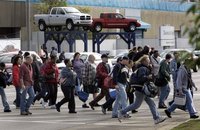Detroit Auto Workers Stunned, Angered as Bailout Fades
- SEE ALSO: $14 Billion Auto Aid Package Dies After UAW Autoworkers Refuse GOP Demands for Swift Wage Cuts
DETROIT December 12, 2008; Kevin Krolicki writing for Reuters reported that William Ford, an unemployed auto worker, grew angry and resigned and then angry again when he thought about the political debate that has stalled a bailout for the once-proud automakers that built Detroit.
"If they can spend billions on war and billions to bail out Wall Street, then they can help the Big Three," said Ford, who was waiting for a bus next to a Chrysler plant on Thursday afternoon as the U.S. Senate debated tightening up terms of a rescue package for the industry.
"We need this help. This is supposed to be the United States," said Ford, 25, who was laid off from his job in a Chrysler LLC engine plant in March.
Ford says he is frustrated with auto chief executives and their private jets, frustrated with Detroit's reputation for shoddy quality, and frustrated that the fate of an industry that has sustained his family for three generations has come to this: a handout from Washington.
"Never in my life did I think we'd see the Big Three crash like this," Ford said.
At Chrysler's nearby Jefferson North assembly plant, the sign still reads DaimlerChrysler though private equity firm Cerberus Capital Management bought Chrysler in August 2007.
Chrysler has announced a $1.8 billion plan to retool the plant to build a new Jeep model. But Chrysler's financial crisis and doubts in its ability to survive even if it clinches a federal loan have thrown its plans into uncertainty.
Just down Jefferson Avenue, General Motors Corp has dimmed some of the lights at its headquarters as it waits for word on whether lawmakers will approve its request for $8 billion in loans to pay bills through January.
WAITING AND WAITING
Like workers at Chrysler and Ford Motor Co, GM's factory workers will be asked to make more sacrifices as the shrunken United Auto Workers union offers new concessions.
UAW-represented GM workers in Flint have been gearing up to make fuel-efficient engines for a new generation of GM small cars, such as the Chevrolet Cruze.
As recently as September, the future looked unexpectedly bright for Flint. GM Chief Executive Rick Wagoner announced a new $370 million plant for the Michigan city, where GM's roots go deep and unemployment already runs over 10 percent.
"I just walked out of a meeting with 350 retirees, and I had to tell them that I don't know what's going to happen," said Bill Jordan, a UAW local president in Flint. "I don't know what's going to happen to their benefits. I don't know what's going to happen to GM."
In Lordstown, Ohio, a glimmer of hope for GM workers is fading, too. GM has plans to build the Cruze in Lordstown and unveiled plans for a $500 million investment in the plant in August in a bold bet that it can make money on a small car.
David Green, president of a UAW local that represents GM's stamping plant in Lordstown, said auto workers were frustrated and angry that their future was being debated -- and delayed -- by lawmakers who had approved a bailout for big banks.
"Our destiny was in our hands for a long time, and we feel like we've done good things and creative things to make GM competitive," Green said. "Now? We're waiting. We're waiting."
GM, Ford and Chrysler employ some 150,000 factory workers in the United States. The auto industry employs 2.5 million workers including suppliers, dealers and related companies.
The automakers warn that failure of one of them could wipe out a shared supply base and cost tens of thousands of jobs. That would worsen the U.S. recession and send Detroit deeper into an economic tailspin that has lasted most of a decade.
Corlis Mayor, a former auto worker, is already living out the bleak future that automakers have warned awaits others. She lost her factory job at Ford in 2004. This week, she was at a soup kitchen first opened by Capuchin monks during the Great Depression.
"It's hard. It's just so hard," said Mayor as she picked up food and clothing for her family. "It's just unimaginable to go from $1,000 a week to nothing."
Back at the bus stop off Jefferson, Ford brightened at the prospect of finishing college, selling his house and leaving Detroit and its dead ends.
But he then told the story of how his grandfather, Eddie Thomas Ford, went to work for the company that coincidentally bears his family name at that automaker's sprawling and historic Rouge complex. And he smiled.
"This is going to affect us, but we're going to make it," he said. "We're the Motor City. We've got no choice."
Reporting for Reuters by Kevin Krolicki, Additional reporting by Poornima Gupta in Detroit and Andrea Hopkins in Cincinnati; Editing by Peter Bohan and Toni Reinhold



